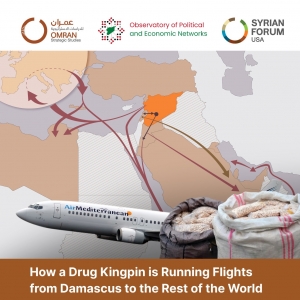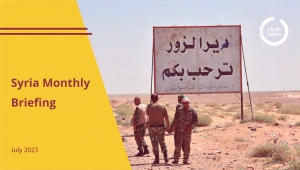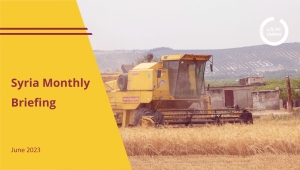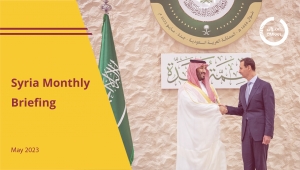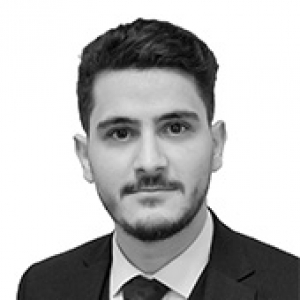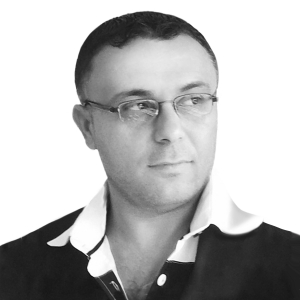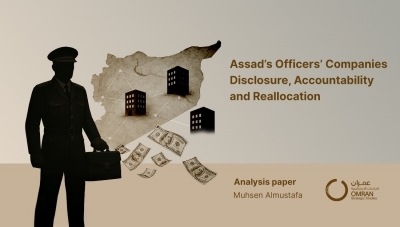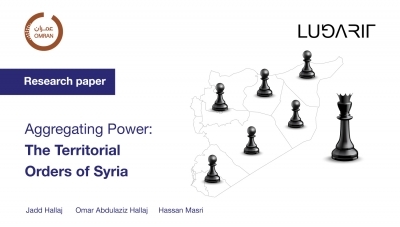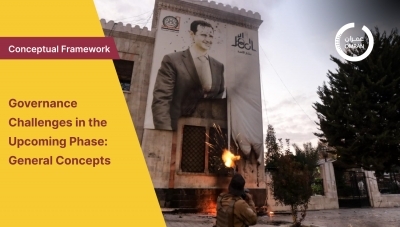Events
Rateb
How a Drug Kingpin is Running Flights from Damascus to the Rest of the World
Summary
A new travel agency with offices in Damascus and Dubai recently announced direct flights from Damascus to European cities for the first time in over a decade. Our research reveals that the agency and its Greece-based “exclusive” partner airline are associated with drug kingpin Mahmoud Abdulilah al-Dj(1) who has been sentenced to death in Libya for drug trafficking. Al-Dj is also the exclusive agent of US-sanctioned Cham Wings in Libya, which has been accused of “[laundering] money throughout the region” and “[moving] weapons and equipment for the Syrian regime.” We’re concerned that the Greek airline, Air Mediterranean, could wittingly or unwittingly be doing the same. Air Mediterranean might havealso engaged in the unsafe aviation practice of switching a transponder off during a flight.
Recommendations
- In compliance with existing sanctions regulations, the EU, US, and other Western countries should sanction al-Dj and his affiliated persons and companies, such as his brother Abdulfattah and FreeBird Travel and Tourism.
- Due to Air Mediterranean’s connections to drug kingpin Mahmoud al-Dj and the Syrian regime, and its potentially unsafe aviation practices, the European Union (EU) should consider blocking the airline from operating in EU airports until an investigation is completed and, in accordance with EU regulations, threaten it with sanctions if it continues its affiliation with al-Dj.
- Western governments should coordinate with Emirati authorities to investigate FreeBird’s operations in Dubai.
- Western governments should coordinate with authorities in Eastern Libya to halt Air Mediterranean and Cham Wings flights to Benghazi.
- The report highlights the need for enhanced monitoring of the activities of drug kingpins and the affiliates of the Assad regime.
SECTION 1: “Hello, Europe – We Are Back”
On 5 March 2023, news began circulating about direct flights between Damascus and European countries, which has not happened in over a decade following the Syrian uprising. AFacebook post from a company called FreeBird Tourism and Travel (FreeBird) invited readers to guess which new destinations in Europe the company was about to announce.
The next day, FreeBird proclaimed in a new Facebookpost, “Hello, Europe—We are back.” In that same post, FreeBird named itself “the exclusive agent of Greek [airline] Air Mediterranean.” The post did not mention whether FreeBird is the exclusive Air Mediterranean (AirMed) agent in Syria alone or the exclusive agent for Air Mediterranean overall.
The response was generally shocked but positive, with over 150 comments on the post. A few people asked why someone in Europe would call a Syrian phone number to book a flight from Europe, but for the most part people seemed excited.
On 9 March, FreeBirdannounced that the first plane from Athens to Damascus had landed.
The “Contact Us” page on FreeBird’s website lists two branch offices, one in Athens and another in Dubai. While the physical office in Dubai is operational, our research showed no evidence of a FreeBird branch in Athens.


Photos (1&2): The Dubai branch of FreeBird Tourism and Travel
SECTION 2: FreeBird Travel’s Owner and His Link to Narcotics: Does He Also Ultimately Own Air Mediterranean?
2.1 FreeBird Travel and Tourism
According to itsFacebook page, FreeBird Travel and Tourism is a Syrian company based in the Free Zone in Damascus with one branchin Dubai.(2) It claims to be a Licensed General Sales Agent for AirMed, described as a Greek carrier. Because of strict business secrecy laws in the Free Zone of Damascus, we could not access the incorporation documents.
Photo (3): FreeBird Travel and Tourism Logo.
Source: Facebook Page “FreeBird Travel Agency Int.” profile picture
FreeBird maintains three Facebook pages:
- FreeBird Travel Agency Int.
- Freebird Dubai
- Freebird (FreeBird - Damascus) [the part in parentheses has been added since we began this report, as well as the address for a Damascus office]
The company’s booking website suggests that FreeBird’s work is limited solely to cooperation with AirMed. Flights are routed from Damascus to Athens and then on to 11 European cities, at least according to the Facebook page (from a graphic in one post). But the booking site lists only three European destinations from Damascus—Düsseldorf, Stockholm, and Athens itself—plus what appears to be an upcoming addition of a flight between Athens and Erbil, Iraq (site accessed 24 August 2023)(3)(4)
Our open-source research revealed that FreeBird is owned by Mahmoud Abdulilah al-Dj. His Facebook work page list includes FreeBird, AirMed, and Cham Wings, a Syrian air carrier currently underUS sanctions andsanctioned by the EU from December 2021 to 18 July 2022.
The US sanctions on Cham Wings were imposed because the Treasury Department’s Office of Foreign Assets Control claimed that Cham Wings continues to have ties to the country’s already sanctioned national carrier, Syrian Air (RB, Damascus), as well as the Syrian government at large. Cham Wings was further accused by the US Treasury of “[laundering] money throughout the region” and “[moving] weapons and equipment for the Syrian regime.”
EU sanctions on Cham Wings were lifted on 18 July 2022. They had initially been imposed in December 2021 because the EU had accused Cham Wings “of flying people to Belarus so they could then illegally cross the EU’s external borders in what flared up into a migration and humanitarian crisis.”
FreeBird is part of a commercial group called “ALDJ GROUP,” which is owned by Mahmoud Abdulilah al-Dj (Chairman of the Board of Directors). According to hisFacebook page, he has been the General Manager of FreeBird in Damascus, Dubai, and Athens since 2017, although we found no public evidence of the company’s activity in Syria before 2023.
But there may be more of a connection between al-Dj, FreeBird, and AirMed than a simple booking arrangement.
2.2 ALDJ Group
FreeBird commenced its activities in Syria in conjunction with the start of AirMed’s flights between Athens and Damascus on 8 March 2023. Additionally, on 22 June 2023, an obscure Facebook page called Watani Press published apost about a launch party of FreeBird that revealed key leads into the person behind the venture:
- FreeBird Travel and Tourism was introduced as an airline rather than a travel agency.
- A photo of the inauguration (below) showed a singer with ALDJ Group’s logo in the background.
- The post states that the launch was attended by representatives from “the embassies of Greece, the Czech Republic, Serbia, and Romania.”
Photo (4): ALDJ Launch Party for FreeBird.
Source: “وطني برس” (“Watani Press”) Facebook Page post 22 June 2023
As mentioned earlier, Mahmoud al-Dj states on his Facebook page that he is also theexclusive travel agent for Cham Wings in Libya (sometimes referred to as Sham or Al-Sham Wings). The promotionalphoto for ALDJ Group, published 20 February 2023, contains a Cham Wings plane and an AirMed plane, suggesting continuous relations between FreeBird and Cham Wings (although Cham Wings flights cannot be booked on the FreeBird website).
Tracking ALDJ Group online confirmed it is owned by Mahmoud Al-Dj. We also found a promotional header that appears to showcase all of ALDJ’s holdings or subsidiaries. Among them is AirMed

Photo (5): Promotional image for ALDJ Group. Note the Air Mediterranean logo on the plane on the left,
the Cham Wings logo on the plane in the center, and the FreeBird
logo atop the mountain peak just to the right of the Cham Wings plane.
Logos for other holdings are also visible in the image.
[Source: ALDJ Group Facebook post 20 February 2023]
- Works at Member and Businessman at the Arab League 8 June 2023–present;
- Owns Nasmet Sham Restaurant & Park on Airport Road, 8 June 2019–present;
- Exclusive Agent for Air Mediterranean, 8 June 2018–present;
- Director General of al-Tayr al-Hor (FreeBird) in Damascus, Dubai, and Athens 8 June 2017–Present;
- Chairman of ALDJ Commercial Holding Group, 8 June 2017–present;
- Exclusive Agent for Cham Wings in Libya, 8 April 2017–present.

Photo(6): The Work listing from Mahmoud Abdulilah al-Dj’s Facebook profile. English translation:
Source: “محمود عبد الاله الدج” (Google Translate: “Mahmoud Abdel-Ilah Al-Daj”) Facebook page, About: Work and Education, accessed 4 September 2023.
Of note in al-Dj’s work listing on his Facebook profile is that he lists himself as the exclusive agent for AirMed. yet lists himself as the exclusive agent in Libya for Cham Wings. This suggests that he considers himself the exclusive agent for AirMed everywhere. The fact that AirMed passenger flights cannot be booked on the airline’s website, but only through FreeBird, suggests the latter is indeed the exclusive AirMed agent everywhere.
2.3 Who is Mahmoud al-Dj?
Mahmoud al-Dj first appeared publicly in August 2013. Syrian state TV published aninterview with him after his arrest on charges of transferring money abroad without a license andfinancing terrorism through the al-Tayr “company” (more below). No information has been released about the time al-Dj spent in detention, if arrested at all, or whether he was tried for the crime in the first place. Al-Dj disappeared from public view until 2018.

Photo(7): Image from Mahmoud al-Dj’s interview on Syrian state television.
Source: Screenshot from a video of the interview
According to various sources, al-Dj is linked to drug trafficking, including hashish and captagon. He has been allegedly linked to a gang that receives smuggled narcotics for distribution; that gang was part of a notable drug seizure in 2018. However, the latest round of sanctions from the US, UK, and EU targeting individuals involved in producing and smuggling narcotics did not include al-Dj.
Areport by The New Arab from 2021 included a document obtained from a court case in Benghazi related to the “Noka shipment.” The Noka, as outlined in a subsequent OCCRP research report, is a cargo ship that, in December 2018, set off from the port of Latakia destined for eastern Libya, but was seized by the Greek authorities before reaching its destination. It was loaded with large quantities of drugs. Detailed in the Libyan sentencing document was that al-Tayr International Trading, a company owned by al-Dj headquartered in Latakia, had rented a warehouse to receive the cargo and store the narcotics.

Photo (8): A copy of the Benghazi court decision
Source: Article from The New Arab, (in Arabic, Google Translate
“Syrian drugs...smuggled to Libya through the “al-Tayr network”) published 28 June 2021
The court document details the operations of a gang allegedly led by “Mahmud Abdulilah Dajj,” a Syrian Libyan. On 21 July 2019, the Benghazi Court of Appeals handed down a verdict accusing al-Dj and his aides of involvement in the Noka shipment, as well as three other shipments seized in Libya: one in the Al Khums port near Tripoli in western Libya, one in Benghazi, and another in Tobruk in eastern Libya. The Benghazi court sentenced al-Dj, in absentia, to death by firing squad. Should al-Dj ever be caught on Libyan soil again, that sentence will be carried out.

Photo (9): Mahmoud al-Dj.
Source: “محمود عبد الاله الدج” (Google Translate: “Mahmoud Abdel-Ilah Al-Daj”)
Facebook page profile picture post 21 February 2022
In addition to his Syrian passport, Mahmoud al-Dj holds another passport, issued by Libyan authorities in the city of Misrata, which makes his Libya-Syria operations easier.
Also of note, Abdulfattah al-Dj works with his brother Mahmoud al-Dj at the FreeBird Company in Damascus (according to hisFacebook profile).

Photo (10): Abdulfattah al-Dj
Source: Facebook profile photo from “عبد الفتاح دج” (Google Translate “Abdel Fattah Dj”) posted 30 March 2021
SECTION 3: Air Mediterranean: Background and Operations
On its face, AirMed is owned by non-Syrian businessmen, but this report highlights its strong connections to al-Dj and perhaps to the Assad regime.
3.1 Background
Air Mediterranean is a small carrier operating from Eleftherios Venizelos International Airport in Athens, Greece (IATA: ATH). Incorporated in 2015, itbegan commercial flights in November 2017 to six destinations: London, Stockholm, Khartoum (Sudan), Jeddah (Saudi Arabia), Casablanca (Morocco), and Baghdad (Iraq). But less than three months later it suspended all flights, due to a disagreement between two of the shareholders(5) Grounded on 18 January 2018, AirMed thenannounced in February of the same year that it would cease all commercial flights and instead focus on charter operations(6)
AirMed’s various social media accounts went silent shortly thereafter. Its last Twitter/X post was on 6 November 2018 (though there was a like on apost from 4 Feb 2019), its last Instagram post was on 9 January 2019, and its last Facebook post on 25 December 2020. Given the internal dispute and then the decision to switch to charter operations alone, the lack of online presence is not surprising.
The reappearance of AirMed came in March 2023, when the Greek City Timesreported that “Greece’s Air Mediterranean will inaugurate the first flight from Europe to Syria in 11 years when one of their vessels lands at Damascus International Airport from Athens on March 9.”
In June 2023, The New Arabreported the first flights to Damascus from Düsseldorf and then from Stockholm, both via Athens. AirMed’s first flight between Düsseldorf Airport and Damascus International Airport (via Athens) took place on24 June 2023. Its first flight between Damascus and Stockholm’s Arlanda Airport (via Athens) was on29 June 2023.
The company’s ownership has changed over time, but it has always included Andreas and Fanti Ilias Hallaq(7) More recently they have included their mother, Nanta, in the company. As of 28 August 2023, the listed administration on the company’spage at the Union of Hellenic Chambers of Commerce website (in Greek, English button available at the top right) are:

Photo (11): Screenshot of AirMed Administrative officers.
Source:https://bit.ly/480wVf9, accessed 28 August 2023
There are two reasons we make the assumption that at least the Hallaq brothers know what they’re doing and who they’re dealing with:
- ALDJ Group publicly introduces AirMed as an official part of their holdings.
- There is evidence that the Hallaq family has at least some access to the Assad regime (from the photo of George Hallaq, Andreas and Fanti’s father, with Syria’s Foreign Affairs and Expatriates Minister Faisal al-Mikdad, shown at the end of Section 4).
AirMed’s website currently indicates it offers commercial, cargo, and charter services. However, individual bookings for AirMed commercial flights can be booked only through FreeBird, further highlighting that al-Dj’s claim to be the exclusive agent of AirMed everywhere is correct. AirMed’s own website is outdated and has no direct booking option.
AirMed also appears to have done a number of “wet leases”(8) to other airlines in the very few months it has been operating commercially, most recently for TunisAir (IATA: TU, national carrier of Tunisia) and AirSerbia (IATA: JU, national carrier).
3.2 Current Operations
An open-source history search on aviation tracking sites FlightAware andFlightRadar24 revealed that AirMed is currently operating flights to and from Athens, Benghazi, Damascus, Düsseldorf, and Stockholm, in addition to Prague in the Czech Republic, Craiova in Romania, Forli in Italy, and Zakynthos and Kefalonia in Greece.
Even though commercial flights have been announced and have taken place, AirMed’s website is still outdated and vague. Under theDestinations page, only Greece and Cyprus are listed as active airports, with “Coming Soon” marked for Israel, Denmark, Germany, and France. There is no mention of Damascus being or becoming a destination, nor are Libya or Sweden mentioned.
As AirMed, their one active plane (registered SX-MAT, See Appendix 1) has flown directly from Damascus (IATA: DAM) 52 times from 30 April 2023 to 28 August 2023, to just three cities:
- Athens (IATA: ATH) - 31
- Benghazi (IATA: BEN) - 16 (none since 28 July)
- Dubai (IATA: DWC) - 5 (none since 28 July)
SECTION 4: Should AirMed and FreeBird operations be halted?
The following facts suggest that the relationship between AirMed and al-Dj’s FreeBird is exclusive; they also suggest the two companies might be, in effect, one entity with al-Dj being the ultimate beneficiary.
- AirMed’s commercial flights cannot be booked on any other site, including their own—only FreeBird’s.
- FreeBird’s launch party introduced it as an airline, not a travel agency.
- AirMed is listed along with FreeBird on ALDJ’s holdings promotion.
- Mahmoud al-Dj introduces himself on his Facebook page as the exclusive agent for AirMed—not as the exclusive agent for Syria, as he did “for Libya” in his Cham Wings listing.
Given Mahmoud al-Dj’s background, running commercial flights into Europe and Libya poses multiple risks. Destination countries face a new potential narcotics supply route. Furthermore, pilots and flight attendants could face arrest if authorities discover contraband on flights—items the employees knew nothing about. Passengers as well could face security scrutiny.
The operation of a new airline between Damascus and eastern Libya is particularly risky. AirMed might engage in activities similar to Cham Wings, which the US Treasury accuses of providing material assistance to the Syrian regime and transporting weapons and fighters between the two destinations. The fact that al-Dj is the exclusive agent of Cham Wings in Libya increases the likelihood that his new partnership with AirMed may engage in similar activities.
Tracking the flights between Syria and Libya has also highlighted some safety concerns. On 31 May 2023, SX-MAT, one of AirMed’s planes, took off from Damascus at 9:16 am local time and landed in Benghazi at 11:20 am local time. It then took off from El Beida International Airport (also spelled Al-Bayda, IATA: LAQ) at 3:22 pm local time and landed in Damascus at 4:22 pm local time. However, there is no flight listed between Benghazi and El Beida, which lie 120 miles apart and in the same time zone. How did SX-MAT get to El Beida without showing up on radar?

Photo (12): The odd flight between Damascus and El Beida, Libya on 31 May 2023.
[Source: Screenshot from FlightRadar24 (seeing it from the link above will require a Gold subscription, as it’s more than 90 days back from the publishing of this report) showing the gap between landing at Benghazi and taking off at El Beida. In the column headers: STD=the stated time of departure, ATD=the actual time of departure, STA=the stated time of arrival.]
The airplane might have flown from Benghazi to El Beida with its transponder off. Flying with the transponder off can pose safety risks as it makes the aircraft less visible to air traffic control and other aircraft equipped with collision avoidance systems. The transponder provides vital information about the aircraft, such as its position, airspeed, and altitude, which is crucial for air traffic controllers to ensure safe separation between aircraft. However, this research could not preclude the possibility that the tracking site failed to capture the flight due to a technical error.
It is not clear whether the official owners of AirMed have a direct connection to the Syrian regime. Andreas and Fanti Hallaq’s father, George, has no public-facing connection to AirMed, though he has been seen and identified in photos with his sons for AirMed promotions. George is known in Greek press circles as arepresentative of the Lebanese investment in the company (the linked article actually describes George Hallaq as the shareholder in dispute with another shareholder who later sold out to the Hallaqs).
However, he does have access to the Assad regime through another channel. On 11 June 2021, the Syrian official news agencySANA reported George Hallaq’s visit to Syria in his capacity as Assistant to the President of theCooperative Republic of Guyana, as Guyana’s Minister of Southern Europe (other news articles specify Greece), the Middle East and Africa, and as Special Envoy of the President. Hallaq met with Faisal Al-Miqdad, Syrian Minister of Foreign Affairs and Expatriates. The two sides agreed to coordinate and consult on various issues of bilateral cooperation between the two countries and in international forums.
The earliest activity of George Hallaq as an official envoy of the President of Guyana dates back to 2006, according to what’s available from open sources. We could not find information on how Mr. Hallaq came to this position nor if he holds Guyanian citizenship.

Photo (13): George Hallaq with Faisal Al-Miqdad.
Source: Syrian Arab News Agency article (in Arabic–Google Translate “Mekdad is discussing with the Special Envoy of the President of Guyana bilateral relations and means of enhancing them,” published 11 June 2021, accessed 28 August 2023
Appendix 1: Air Mediterranean’s Fleet
Air Med is recorded as having three planes in its fleet, tail registrations SX-MAH, SX-MAM, and SX-MAT (Itsinitial registration with the Hellenic Chambers of Commerce indicates only two planes; SX-MAH appears to have been acquired later).
SX-MAH
According to FlightRadar24, SX-MAH is a Boeing 737-405 operated by Air Med, Type Code B734, Mode S 46B428, Serial No. (MSN) 24643, Age (May 1990) 33 years. It has no flight history for the past five months (from 30 April 2023).
SX-MAM
According to FlightRadar24, SX-MAM is a Boeing 737-405 operated by Air Med, Type Code B734, Mode S 46B42D, Serial No. (MSN) 28097, Age (Jul 1997) 26 years. It has made only one flight in the past five months, from Barcelona to Tel Aviv as Bluebird Airways (Greece). SX-MAM was also subleased at least once during January 2020–October 2021 to Felix Airways(Yemen).
Planespotters.net corrects the aircraft type to a Boeing 737-446, and adds that SX-MAM was leased from Air Med from June to October 2021 by Felix Airways, headquartered in Yemen. Felix Airways had also leased the plane once before from Air Med, from 12 October 2020 to 12 April 2021. But their website is dark now—they appear to have gone out of business.
SX-MAT
From FlightRadar24: SX-MAT is a Boeing 737-446 operated by Air Med, Type Code B734, Mode S 46B434, Serial Number (MSN) 28831, Age (Jul 1997) 26 years. Planespotters.net adds that it was delivered to Air Med on 1 November 2022 after being “not taken up” by Greece’s Aeolian Airlines.
Of AirMed’s fleet, only SX-MAT has any flight history at all since 30 April 2023 (SX-MAM had active flights until 14 April 2023, but none since), and in that time the plane has operated, probably under wet lease conditions, for other carriers as well as for Air Med:
- Air Mediterranean
- LEAV Aviation (a German regional airline)
- Sunclass Airlines (a Danish charter service)
- Smartwings (the largest carrier in the Czech Republic)
- AirSerbia (Serbia’s national carrier)
- TunisAir (Tunisia’s national carrier)
Appendix 2: Air Mediterranean Current Administration
Andreas “Andrew” Hallaq (ΧΑΛΛΑΚ ΑΝΔΡΕΑΣ | أندرياس حلاق) was listed as Director of Air Mediterranean on the carrier’s website in a Press Release dated 17 January 2017; he was also defined as the Director in an article by Times Aerospace around the same time. Per an announcement filed 4 July 2022 with the Hellenic Chambers of Commerce, he is now listed as a member of the Board of Directors, continuing as of 28 August 2023.
He is the son of Georgios (George) and Nada (Nadia, Nanta) Hallaq, born 1984 in Philadelphia, Pennsylvania. He is self-employed and a resident of Kuwait and temporary resident of Greece. The Hellenic Chambers of Commerce site lists him as “a foreign resident of Greek citizenship.”
Fanti Ilias Hallaq (ΧΑΛΛΑΚ ΦΑΝΤΙ ΗΛΙΑΣ | فادي الياس حلاق) was listed as CEO of Air Mediterranean on the carrier’s website—Press Release dated 6 December 2016.Per an announcement filed 4 July 2022 with the Hellenic Chambers of Commerce, he is now listed as a member of the Board of Directors, continuing as of 28 August 2023.
He is the son of Georgios and Nadia, born 1980 in Beirut, Lebanon. He is a “businessman” of Greek citizenship residing in Smyrni, Greece (an Athens suburb).
Nada (Nadia, Nanta) Hallaq (ΧΑΛΛΑΚ ΝΑΝΤΑ), mother of Andreas and Fanti, born 1958 in Lebanon and residing in Athens, holds the position ofChairman of the Board of Directors of the company, according to the Greek General Commercial Register as of 04 April 2022. Per an announcement filed 4 July 2022 with the Hellenic Chambers of Commerce, she is still listed as Chairman of the Board, but on the Hellenic Chambers page for Air Med she is listed as the president of the company.
Marios Sambrakos (ΣΑΜΠΡΑΚΟΣ ΜΑΡΙΟΣ), a Greek national, was born 1962 in Athens and resides there. Per an announcement filed 4 July 2022 with the Hellenic Chambers of Commerce, he is listed as a member of the Board of Directors
Syria Monthly briefing - July 2023
General Summary
This report provides an overview of the key events in Syria during the month of July 2023, focusing on political, security, and economic developments. It examines the developments at different levels.
-
Security and Military Sector: The eastern parts of Syria have seen heightened military activity by several groups along the Euphrates River. Additionally, disagreements between the Deir Ezzor Military Council and the Syrian Democratic Forces “SDF” have led to armed clashes and road blockades in the northern Deir Ezzor villages and towns.
-
Political Sector: The continuation of the Arab rapprochement initiative, this rapprochement appears to be contingent on the reciprocal actions and offerings from the Assad regime, emphasizing a “Step-for-Step” approach. Furthermore, Russia's veto against the extension of cross-border aid challenges the UN and other humanitarian organizations, necessitating new strategies to deliver aid amidst Syria's dire humanitarian crisis.
-
Economic Sector: Syria's economic situation is deteriorating, marked by a significant rise in the cost of living paired with decreasing salaries. Concurrently, the Assad regime is aiming to further assert its control over vital resources and gain a monopoly over critical, high-revenue sectors, benefiting both the regime and its allies.
Internal Security Issues and Rising Military Presence Across Various Frontlines
Regime Held-Areas:
Israel conducted strikes on multiple security and military sites in the regions of Damascus countryside, Eastern Homs, and Tartus. Out of the five sites targeted, three are under the control of militias backed by Iran. ([1])
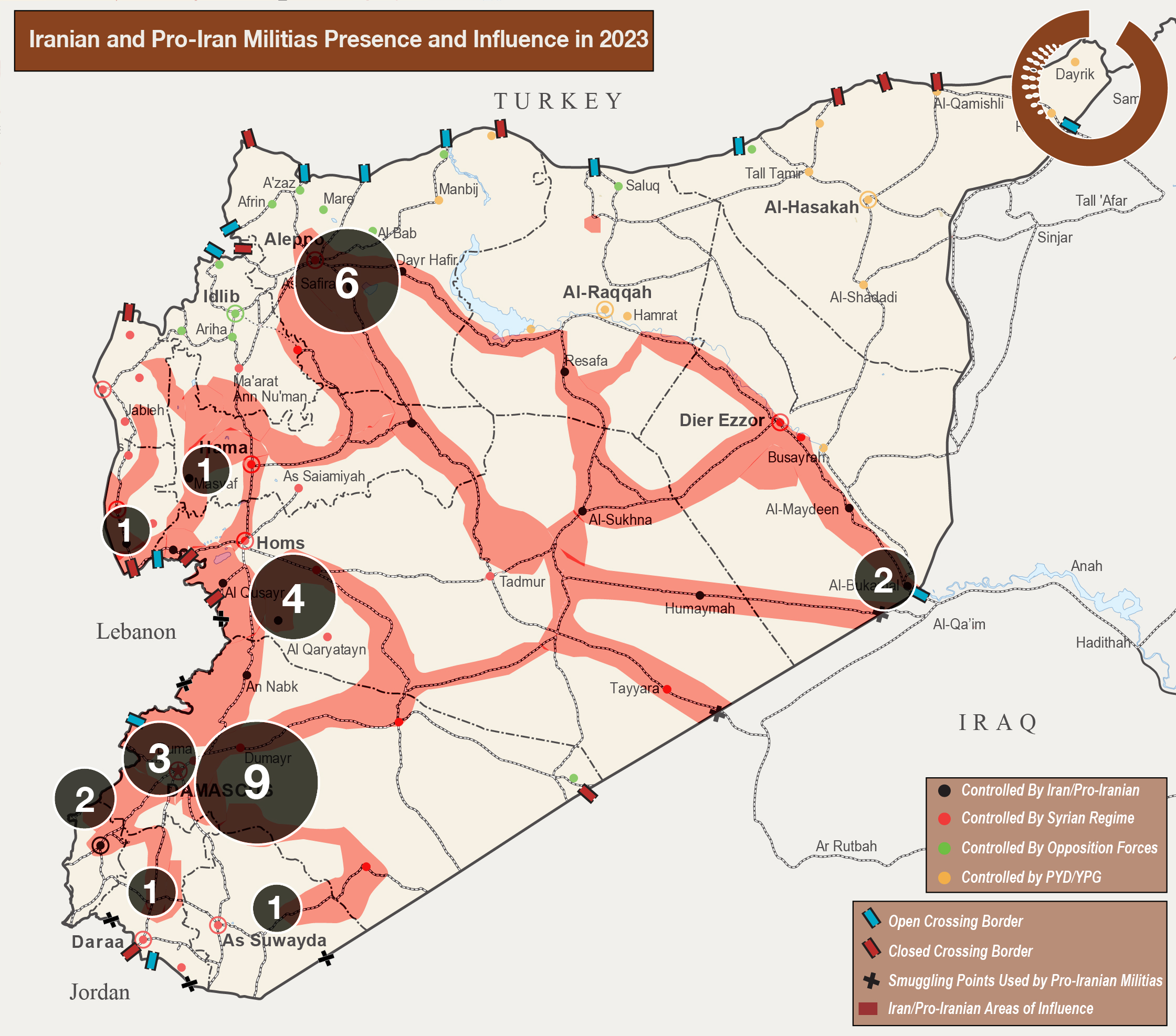
Map (1), Highlighting Israeli strikes in Syria from January of 2023 to July 2023
Security chaos continues in the south, /37/people were assassinated in Daraa province, with /20/ more in various security incidents throughout the month. During July, the regime used drones in its operations in Daraa, hinting at a shift to newer security tools, possibly supported by Iranian expertise.
In al-Suwayda Province, in retaliation for the regime's recent arrest campaign, local groups apprehended regime officers. Such incidents highlight the regime's fragile security control in the province.
Opposition Held-Areas:
Hay'at Tahrir al-Sham “HTS” continued its security campaign, arresting over /300/ of its members from different departments, accused of spying for the Syrian regime, Russia, or the USA.
SDF Held-Areas
Deir Ezzor witnesses military mobilizations by various parties along the Euphrates River.
-
Numerous military supply convoys for the International Coalition have reached their bases near the al-Omar oil field.
-
The Syrian Democratic Forces “SDF” have increased their presence and set up operations rooms in Deir Ezzor.
In the northern countryside of Deir Ezzor, several villages and towns experienced clashes between the “Deir Ezzor Military Council” and the SDF's Military Police. This conflict arose following the killing of two council members and the detention of several others.
International Coalition forces intervened to mediate and stabilize the situation, assuring that those responsible for the incident would be held accountable. These events highlighted the vulnerabilities within the SDF's internal unity and underscored concerns about the PKK's dominance over these forces, often sidelining local factions in decision-making.
A general strike took place in Manbij city against the conscription campaign carried out by the SDF.
Despite Renewing International Ties, Assad Regime Continues to Use Extortionate Behavior
Following the failure of the UN Security Council to extend the decision on cross-border aid delivery due to Russia's veto, the Assad regime announced that it would allow the UN and its specialized agencies to deliver humanitarian aid through the Bab al-Hawa crossing, on the condition that it would not be handed over to what he termed as “Terrorist Entities”, and the aid distribution should be coordinated with the Syrian Red Crescent. Several Western countries rejected this, and the UN considered it contrary to its independence and freedom of operation. The regime aims with this decision to control the UN aid and use it as a new tool to put more pressure on the international communities and the Syrian oppositions. Meanwhile, Bashar al-Assad received the Iraqi PM, Mohammed Shia' al-Sudani, in Damascus during his first official visit for an Iraqi PM since 2011. Al-Sudani emphasized the importance of coordination between the two countries. Assad mentioned the “Theft” of Syria's and Iraq's water by neighboring countries in supporting terrorism, referencing Turkey, Despite Erdogan's expressed willingness to meet with Assad, the path to reconciliation has been hindered due to the regime's preconditions, primarily the demand for a withdrawal timetable from Syria.
On a technical level, the first meeting of the Jordanian-Syrian Committee to Combat Cross-Border Drug Smuggling took place in Amman. This committee was established following the decisions made at the consultative meeting hosted by Jordan in Amman last May.
Fragile Markets and Increasing Economic Challenges
The SYP rate continued to fall against foreign currencies, registering /13,000/ SYP to the US Dollar in markets of Damascus, Aleppo, Idlib, and al-Hasakah. Meanwhile, the Regime Central Bank adjusted the US Dollar exchange rate to /9,900/ SYP for banking operations, money exchange companies, individuals, and foreign transfer exchange rates.

This month's SYP depreciation is attributed to the vast amount of money introduced into the market due to wheat payments, estimated at 2 trillion SYP (2,000 billion SYP) for purchasing /800,000/ tons of wheat from farmers in Regime held-areas. It's valued at $/516/ million in SDF held-areas in northeast, and $/64/ million in Opposition held-areas in northwest, causing a cash surplus. The central bank also approved printing a /5,000/ Lira note to add to market liquidity. The decrease in the SYP’s value led to a significant, uncontrolled increase in the prices of co0mmidities in regime held-areas, with some products witnessing over a 200% increase. The average living cost for a family of 5 in Syria has reached more than /6.5/ SYP, while the average salary stands at /150,000 SYP/.
Given these continuous crises, the PM of the regime, “Hussein Arnous”, announced the formation of a joint committee from the People's Assembly and the economic committee in the Council of Ministers to prepare a proposal to boost the economic and living conditions, even though the People's Council admits its inability to change the country's economic reality.
During the UN Food Systems Summit in Italy, Agriculture Minister “Mohammed Hassan Qatana” urged his Saudi counterpart, “Abdul Rahman al-Fadhli”, to ease the import of Syrian goods into the kingdom. Meanwhile, the Director General of the regime's Civil Aviation Corporation announced that Saudi Arabia has approved the resumption of flights between the two Syria and KSA. Consequently, the Syrian Arab Aviation Corporation has started setting up its offices in Riyadh.
The regime's Ministry of Transport announced an investment partnership with “Iluma”, a company closely linked to Bashar and Asma al-Assad, for the Damascus International Airport. The General Organization for Aviation will retain a 51% stake, while the investing company will hold 49%. “Iluma” will be responsible for all tasks and services related to air transport of passengers and goods, including owning, purchasing, leasing, and investing in aircraft, as well as organizing flights and ground services. This move underscores the regime's strategy to exert control over resources and monopolize key sectors, ensuring significant returns for itself and its allies.
In Opposition held-areas, food prices have surged by 48% in the past six months due to the depreciation of the Turkish lira. According to the UN REACH team, the minimum expenditure on basic food items has increased from /1,600/ TL to nearly /2,700/ TL within a year.
In eastern Syria, the Autonomous Administration raised fuel prices, leading to a temporary halt in sales at gas stations until new prices were set, also the cost of diesel for vehicles and industrial purposes rose from /425/ SYP to 525 SYP per liter, while the cost of free diesel rose from /1,200/ SYP to /1,700/ SYP per liter. However, diesel prices for generators and bread ovens remained unchanged, but the cost of a domestic gas cylinder increased, going from /7,500/ SYP to /10,000/ SYP.
The Autonomous Administration has designated the regions of al-Hasakah, Tal Tamr, and their surrounding areas, as disaster zones due to the ongoing water crisis. The water scarcity in Hasaka has worsened since 2019, primarily because of water supply disruptions from the opposition-controlled “Alouk” wells. Additionally, in al-Qamishli, the devaluation of the SYP value to less than a third of its value since early July has led to a decline in food sales. Both consumers and retailers have reported a drop in food orders by up to 70%.
[1]See Map (1) Israeli strikes break down in 2023, Map is designed by Omran team, and the information is based on credible open source along with Omran team special private source in Syria.
Syria Monthly briefing June 2023
Executive Summary
This report provides an overview of the key events in Syria during the month of June 2023, focusing on political, security, and economic developments. It examines the developments at different levels.
- Security and Military sector, the report highlights the following: 1) Opposition held areas in northwest Syria witnessed intensification of Russian strikes. 2) Rise in ISIS security operations in eastern Syria. 3) Increase in assassination victims, and clashes between local factions and militias associated with the regime forces in Daraa.
- Political sector, the report highlights the regime's ongoing efforts to foster closer ties with the Arab world through economic agreements, considering the Western resistance towards normalizing relations or lifting sanctions without substantial measures undertaken by the regime.
- Economic sector, the report focuses on the persistent depletion and devaluation of the Syrian pound, a consequence of the economic and financial policies pursued by the Assad regime. In the meantime, local councils and civil organizations in northwestern Syria have successfully concluded the implementation of numerous early recovery projects across several critical sectors, with particular emphasis on the industrial sector.
High indicators of security instability
In northwestern Syria, both the regime and Russia have conducted aerial and artillery bombardments in several areas in Idlib. This ongoing security and military complexity can be used as pressure to reach understandings or technical agreements, particularly due to the increased military capabilities of local actors in both regime-controlled and opposition-controlled areas. Simultaneously, Hay'at Tahrir al-Sham security forces have arrested over 80 individuals accused of engaging in dealings and espionage for hostile parties. Among those detained are notable figures from the General Security Agency and certain military brigades.
In northeastern Syria, ISIS has claimed responsibility for more than 24 attacks targeting the Syrian Democratic Forces (SDF) and their allies. These attacks resulted in the death of 11 people and left 26 others wounded. The following charts provides a comparison of ISIS attacks against the SDF between April and June for the years 2022 and 2023.
| 2022 | 2023 | Difference ratio | |
| April ISIS attacks | 34 | 13 | - 61.76% |
| May ISIS attacks | 11 | 8 | - 27.27% |
| June ISIS attacks | 17 | 24 | + 41.18% |
The Autonomous Administration in northeastern Syria has made a significant announcement. They have decided to initiate public prosecutions for approximately 10,000 ISIS operatives who are currently detained by them. This decision was prompted by the international community's delayed response to the autonomous administration's requests for assistance in repatriating their detained citizens. The trials of these operatives will be conducted in accordance with a local anti-terrorism law that was developed in 2022. While the ISIS operatives on trial will have the right to appoint their own lawyers, it has not been clarified whether the court will appoint lawyers for them. It's important to note that the death penalty is not applicable in northeastern Syria. Furthermore, Turkey persistently refused to acknowledge the Autonomous Administration, labeling it as a "terrorist" entity associated with the Kurdistan Workers' Party (PKK). In line with this stance, Turkey continued its strikes against the administration's leaders and key figures. Most recently, Turkish drones conducted an airstrike on a vehicle transporting the leaders of the “Qamishlo Provincial Council|” in the eastern part of Qamishli. The strike caused the death of the co-chair of the Council, the deputy co-president, and the driver, while the co-chairman of the council, "Kabi Chamoun," sustained severe injuries as a result of the drone strike.
Regarding Daraa, ongoing evident signs indicating the failure of the regime's efforts for reconciliations and settlements. The notable indicators include:
- Ongoing assassinations: A total of 30 individuals were killed in targeted assassinations during the month. Additionally, eight people lost their lives in other security incidents.
- Clash between local factions and pro-Assad militias near the Naseeb crossing, situated along the Syrian Jordanian border.
- Continuation of drug smuggling operations across the Jordanian border, either through the Naseeb crossing or the border strip.
The Assad regime between Arab rapprochement and western rejection
During the month of June 2023, the Syrian regime recently made several diplomatic moves. They appointed an ambassador to the Arab League, and their foreign minister visited Iraq and Saudi Arabia, resulting in an agreement to resume economic cooperation between Syria and Arab countries. Additionally, Bashar al-Assad, the Syrian leader, met with the United Nations Under-Secretary-General for Humanitarian Affairs and Emergency Relief Coordinator. During their meeting, al-Assad emphasized the importance of not politicizing the return of refugees and providing the necessary resources for reconstructing damaged structures and rehabilitating service facilities.
However, these statements by Assad also highlight the regime's refusal to address key security concerns regarding the safe return of refugees. These concerns include stopping security prosecutions against refugees, controlling, and restructuring the security services, and releasing detainees while reforming the judicial system.
It is likely that in the future, the Assad regime will continue to exploit the refugee issue to pressure the international community. Their aim is to achieve economic gains and the lifting of sanctions imposed on Syria.
In a parallel development, Canada and the Netherlands jointly lodged a lawsuit against the Assad regime at the International Court of Justice in The Hague. The lawsuit accuses the regime of torture and violations of international law, highlighting the ongoing stance of Western countries rejecting any form of normalization with the Syrian regime government.
During the recent 20th round of the Astana meetings, the final statement included several significant points. One of the key highlights was:
- Rejection of unilateral sanctions that violate international law, international humanitarian law, and the UN Charter. This statement implies the potential development of a Turkish stance favoring the lifting or easing of sanctions on the Assad regime.
- The participants at the Astana meetings expressed their approval of the regime's consent to allow aid entry through the al-Rai and Bab al-Salama crossings. This reaffirmed their opposition to any attempts to bypass the regime and Russia's approval after the extension expires in August 2023.
Current economic policies increasing Syrian’s suffering
In the Regime areas, The Syrian pound continues to experience massive declines against the US dollar, reaching a rate of 9,250 SYP per dollar. These declines are a result of the economic and financial policies implemented by the regime government. To restore stability to the currency, the Monetary and Credit Council issued a decision allowing individuals entering Syria to bring in financial revenues up to $500,000. However, those leaving the country are restricted from taking out more than $10,000 or its equivalent in foreign currency. Living conditions in regime areas remain challenging, with the population enduring rising prices during Eid al-Adha. Price increases ranged from 15% to 45%, with notable examples such as the cost of "30 eggs" reaching 30,000 SYP in Daraa and 34,000 SYP in Damascus. The price of sacrificial animals during Eid al-Adha reached 3 million SYP in certain areas, recording a 6 time increase for 2022 price. Reports indicate a significant decrease in foreign remittances to Syria during Eid al-Adha compared to Eid al-Fitr. The regime government refrained from providing any financial grants or salary increases prior to Eid al-Adha. The regime's Ministry of Finance estimated inflation rates for 2022 at 10-0% and projected a range of 10-4.7% for 2023. It is important to note that the inflation rate has reached approximately 16,000% between 2011 and 2023.
In Opposition areas, both the interim government and the salvation government have established the price of durum wheat at $330 per ton, and the price for soft wheat is set at $285 per ton. On the other hand, in areas under the Autonomous Administration, the price of durum wheat is set at $430 per ton, while in regime-controlled areas, it is set at $222 per ton.
This difference in pricing may discourage farmers in opposition areas from selling their crops to the regime or motivate them to consider alternative crops that offer higher profits, given the current pricing conditions. As part of early recovery initiatives, local councils and civil society organizations have successfully completed various projects across multiple sectors. For instance, the local council in Mare' inaugurated a new industrial city consisting of 50 operational factories and 100 others in the process of being equipped. In the city of al-Ra'i, a significant infrastructure development project, involving the establishment of a major transformer for the industrial zone, has been implemented to facilitate future projects.
In the Autonomous Administration, citizens in Hasakah protested the shortage of domestic gas, which led to its price doubling on the black market to 150,000 Syrian pounds. In Amuda market, remittance and currency exchange companies closed in objection to new licensing requirements that impose financial guarantees and office conditions beyond their capabilities. Additionally, the Customs Department has implemented a new customs system. The updated fees for shipments of vegetables and fruits are as follows:
| Item | New customs fees per ton |
| Potatoes – Tomatoes – Green Onions | 3$ |
| Onions | 10$ |
| Garlic | 20$ |
| Cherries (non-local) | 6$ |
| Bananas (non-local) | 16$ |
| Pineapple (non-local) | 60$ |
The fire brigade in al-Hasakah province has reported crop fire damage in 2023. Approximately 370 dunums of land in the countryside of al-Hasakah city and 418 dunums in al-Qamishli city have been affected.
Syria Monthly Briefing May 2023
General summary
During May 2023, the majority of Arab countries moved towards fully restoring relations with the Assad regime, leading to Bashar al-Assad attending the Arab summit in Saudi Arabia, breaking a decade-long isolation. The Syrian regime saw this as the official end of the regional and international isolation that was imposed against the Syrian regime. Regarding security development in the southern region, 2 Jordanian fighter jets conducted raids, eliminating one of the big local drug dealer in as-Suwayda's eastern countryside. While in the Northwest region, Turkish security forces raided the hideout for an ISIS cell, leading to the arrest of several ISIS members, including a high commander known as “The Wali of Turkey”, also during the same month Turkey in corporation with the US, imposed new sanctions on individuals financing “Hay'at Tahrir al-Sham” in Syria.Economically, livelihood situation in different areas of control is still in decline, as the month of May witnessed a new price increase for most commodities.
Syrian regimes return to Arab League
The most prominent political event in May was the return of the Assad regime to the Arab League, marking a new stage of formal Arab engagement with Syria after a decade-long hiatus. This Arab rapprochement focuses on security issues, counterterrorism, humanitarian issues, particularly refugees, and the political process. However, the evolution of Arab engagement largely depends on the regime's response to political developments and its willingness to make concessions it has avoided over the years. Assad is relying on Arab openness as a step to pressure the United States and the European Union to ease or lift sanctions on his regime, claiming they hinder progress in the Arab solution initiative. Regionally, the visit of the Iranian President to Syria was significant in its timing, just days before the Arab League's decision to formally reconnect with the regime. The visit reaffirmed Iran's strong influence in Syria and preempted any attempts to diminish it.
In summary, Arab rapprochement with the Assad regime is part of a regional policy to deescalate tensions, in addition to addressing security issues related to the Syrian crisis.
Eliminations and reconciliations
In May 2023, Israel carried out aggressive air strikes on Damascus and Aleppo provinces, hitting security sites near their respective international airports and causing temporary shutdowns. This occurred as Israel's Defense Minister, “Yoav Gallant,” declared an increase in attacks aimed at Iran's presence in Syria.
Meanwhile, Turkish security forces succeeded in arresting /4/ ISIS members, including the self-proclaimed (Wali of Turkey). This happened after the Turkish forces had neutralized ISIS leader, “Abu al-Hussein al-Qurashi”, in late April. Also in the Northwestern region, and as part of the Turkish collaborative efforts against terrorism, the US and Turkish treasury departments imposed combined sanctions on 2 individuals tied to financing of extremist factions in Syria.
In Northeastern Syria, an IED’s killed “Kribos”, a leader in SDF. Furthermore, the Asayish security force, arrested 2 individuals involved in drug trafficking.
In Southern Syria, the Regime government initiated a new settlement in 45 towns, this campaign coincides with an ongoing conflict between the Military Security and the 8th Brigade, and a fragile security situation, also this settlement campaign is considered the 3rd one in Daraa since 2018.
Meanwhile, Jordanian fighters eliminated a drug dealer in the Eastern countryside of As-Suwayda shortly after Jordanian Foreign Minister “Ayman Safadi” declared the possibility of using military force to combat drugs, which is an indication of the possibility of resorting to force options in addition to economic incentives in the Arab way of dealing with the Syrian regime, including drugs production and smuggling.
Reviving a long dead economy
In hopes of capitalizing on improving Arab relations, the Assad regime is gearing up for the tourism season, with a particular focus on attracting visitors from the Gulf countries. Tourism, which was the second-largest source of foreign income after oil exports, generating approximately $3.9 billion in 2010, is seen as a vital avenue for bolstering Syria's economy. Estimates suggest that about /2.5/ million people, including /700,000/ tourists, might visit Syria this year.
Additionally, Bashar al-Assad issued a law exempting cow imports from taxes and fees for the next 5 years. This move is aimed at mitigating the Syrian crisis' impact on the livestock sector, high meat prices, and decreasing livestock numbers. However, this approach, which is characteristic of the old regime, might benefit corrupt merchants and warlords while negatively affecting ordinary people's living conditions, it's seen as a way to address economic issues primarily through increased imports.
In Northeastern Syria, the Autonomous Administration announced the pricing of wheat and barley for the 2023 agricultural season, at /43/ cents per kilogram for wheat and /35/ cents per kilogram for barley. This is the 1st time the Administration set crop prices in $ instead of SYP due to the declining value of the latter, causing unprecedented inflation for goods and services. In Hasakah province, (ampere) prices rose by 30% due to a reduction in the subsidized diesel amount sold to generator owners by the Administration. The closure of the “Semalka-Fishkhabour” crossing between Northeastern Syria and Kurdistan led to significant slowdowns in construction and a halt in some projects due to a shortage of cement, and /50/ kilogram bag of cement reached a black-market price of /120,000/ SYP, up from /85,000/ Sp before the crossing was closed.
In opposition held-areas, the decline in the value of the Turkish lira against the dollar led to deteriorating living conditions in Idlib and a slowdown in market transactions. Changes in the lira-dollar exchange rate quickly affect local markets due to imports mainly coming through Turkey. Meat prices doubled, with one kilogram of lamb now costing /190/ TL, up from /80/ TL two months ago. This increase is due to livestock smuggling to regime-controlled and autonomous areas, in addition to rising feed costs.
The Economy and Resources Ministry of the "Salvation" Government in Idlib set the purchase price for first-grade hard wheat at $320 per ton (/32/ cents per kilogram). This year's initial wheat production is estimated at /99,000/ tons.
Work continues on paving main and secondary roads in Azaz, al-Bab, and Jarabulus, as part of early recovery efforts. New schools, like Al-Khwarizmi in Azaz and Shariah school in Afrin, are being established, while others in Janders are being renovated. Furthermore, Turkish Interior Minister Suleiman Soylu and Gaziantep Mayor Fatma Sahin laid the foundation for a project to build 240,000 homes on farmland near Al-Ghandoura.

